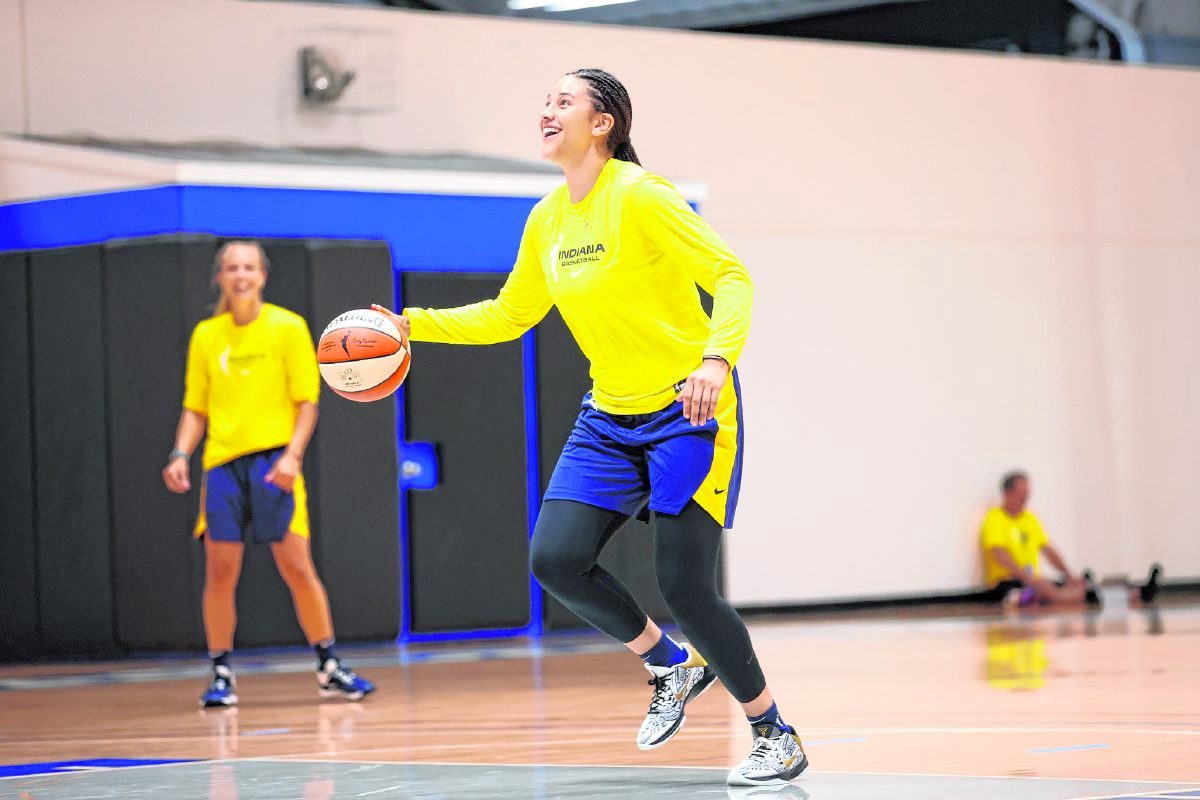
The message on Natalie Achonwa’s shirt summed up the thoughts in her head more vividly than the pick and roll.
“Bet On Women,” it read.
Achonwa, a 6-foot-3 rebounding forward out of Notre Dame from Canada, leaves a big footprint on the court for the WNBA’s Indiana Fever, but she is seeking to leave a bigger mark on the Indiana community.
Recently, the five-year veteran, who has averaged as many as 10 points a game in a season but in this 2-2 year so far has struggled with a hamstring injury, was presented with the league’s most prestigious off-court award.
[sc:text-divider text-divider-title=”Story continues below gallery” ]
Achonwa was given the Dawn Staley Community Leadership Award that honors the current South Carolina coach and Olympic gold medalist’s spirit, love of the game and commitment to community.
There was a time when the casual sports fan relentlessly criticized professional athletes for being overpaid and being all about me, me, me.
While athletes in most pro sports, though not the WNBA, make more money than anyone except Hollywood actors and Hedge fund operators, more and more, they seem to create personal foundations, donate large sums of money to causes they care about and try to do good away from the field.
Baseball star Albert Pujols and his wife focus on helping children with Down syndrome; football star Eli Manning aids the March of Dimes and those in need of food; Los Angeles Dodgers pitcher Clayton Kershaw helps poverty-stricken areas in Africa; tennis star Serena Williams donates time as a UNICEF ambassador and money to fight breast cancer; and stock car racer Jeff Gordon funded a pediatric research center at Riley Hospital for Children.
Achonwa is not in the income bracket of those athletes, but her mind works the same way. Her goal to encourage the entrepreneurial gene in minority women and in conjunction with the Madam Walker Legacy Center in Indianapolis led to a WNBA $10,000 grant. They money will be used as seed money for four women with ideas to provide a head start in the business world.
Achonwa said she had long heard minority women are “disadvantaged in the workplace,” and this type of support can change that.
“This is allowing women to work for themselves,” she said.
Being out there, being visible, being part of the community is important to Achonwa. She also has spoken to students in Indianapolis public schools on mental health issues and has been out front discussing racial matters as the country wrestles with its historical behavior toward African-Americans.
For the longest time, sports fans seemed only interested in whether or not their favorite athletes could put the ball in the basket or hit home runs. Teams felt it best to sit out political debates so as to not alienate customers.
Now many sports fans want to know what their players think about a controversy, what role the local team is going to play. As the Black Lives Matter protests spread across the United States, numerous athletes were in the forefront, telling their own stories of being discriminated because they were minorities and teams took vocal stands.
The NBA has been the leader in mixing sport and society, in expressing concern and understanding on issues of substance, setting the example for other professional leagues.
Achonwa, 27, is a current-day player mature enough to grasp what is going on in the world around her and bold enough to seize the moment and try to make a difference.
“I truly believe we can be better,” she said of people at large. “You can’t stand on the sidelines.”
Athletes in other leagues make far more money than WNBA players, and that gives them the power to make a major impact. Dollar signs alone, though, do not explain gestures from the heart.
Perhaps no one is better positioned than Fever general manager Tamika Catchings to observe Achonwa’s actions. Catchings, one of the greatest players in WNBA history, lived the talk, twice winning the Staley award for her own charitable efforts.
“I have been so impressed by how Natalie has stood up,” Catchings said.
In the community, in public and as an emerging team figure, Achonwa now has extra cred as a selfless leader for the Fever.
Lew Freedman is the Sports Editor for The Tribune. Send comments to lfreedman@ aimmediaindiana.com.
